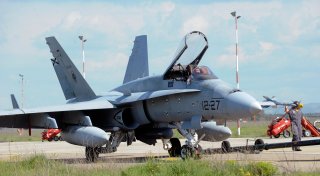What the War Against ISIS Taught the U.S. Military
Inter-Allied capabilities are very powerful, but they aren't easy to coordinate and put together.
The Commander of Operation Inherent Resolve tasked with destroying ISIS says coalition members were able to achieve “effects” against the enemy which the U.S. was unable to perform.
General Jeffrey Harrigian, who in effect ran the war from an Air Operations Center, explained the challenges and benefits of harnessing the collective power of an entire coalition of allied nations.
“Coalition warfare is not easy, you will have to thread the needle in terms of how you communicate intent so everybody has skin in the game,” General Jeffery Harrigian, Commander, U.S. Air Forces in Europe; Commander, U.S. Air Forces Africa; Commander, Allied Air Command, said in a special Mitchell Institute of Aerospace Studies video discussion.
Coalition partners conducted air attacks, performed reconnaissance missions, gathered intelligence and networked information across a combined force.
“The Coalition offered me capabilities where they were allowed to contribute effects we couldn’t,” Harrigian explained.
There are a lot of challenges with these kinds of operations, as many countries operate with different data links, computer protocol and warfare tactics, among other things. Such challenges are part of the reason why the U.S. so often conducts a range of interoperability exercises with allies throughout the European continent.
For example, for drone video feed networking, there are a variety of different technical protocols that are used, such as Tactical Common Data Link or NATO Stanag 4569 standards. When it comes to radio communications, countries often have to ensure that they are using the same frequency and, in some cases, encryption that is aligned.
Also, while expanded networking brings unparalleled advantages, there are also additional vulnerabilities that can emerge in terms of security. For this reason, the U.S.-led coalition is taking great pains to harden its networks and properly organize information to ensure that both connectivity and security can coexist.
The advantages are numerous. One country can find targets and pass along information to other partners to execute. This gives pilot crews the opportunity to rest in some instances and share the burden of continued attacks and dwell time over target areas in others. This can be crucial as key targets can quickly emerge or change location.
Forging successful combat partnerships across Europe and the Middle East is something likely to prove quite valuable when it comes to potential U.S. engagement against a major power adversary, such as Russia in particular. For example, several years ago, the United States conducted what was called a Dragoon Ride convoy across Europe to demonstrate readiness, deployability, allied cooperation and technological interoperability. Such an exercise proved extremely useful in Eastern Europe as those countries are of vital strategic significance in efforts to deter Russia.
Given all this, while ISIS has been extinguished to a very large degree, the United States is undoubtedly leveraging lessons learned from coalition cooperation to better prepare NATO and other allied partnerships for potential major power engagement.
These kinds of lessons could bring indispensable advantages in terms of learning and preparation. While the U.S. coalition enjoyed substantial air superiority in the war against ISIS, such air supremacy is by no means guaranteed in any major power engagement. Therefore, attacking ISIS could likely help the U.S. coalition refine tactics, techniques and procedures as well as technical processes to prepare for major war.
Kris Osborn is the new Defense Editor for the National Interest. Osborn previously served at the Pentagon as a Highly Qualified Expert with the Office of the Assistant Secretary of the Army—Acquisition, Logistics & Technology. Osborn has also worked as an anchor and on-air military specialist at national TV networks. He has appeared as a guest military expert on Fox News, MSNBC, The Military Channel, and The History Channel. He also has a Masters Degree in Comparative Literature from Columbia University.
Image: Reuters

